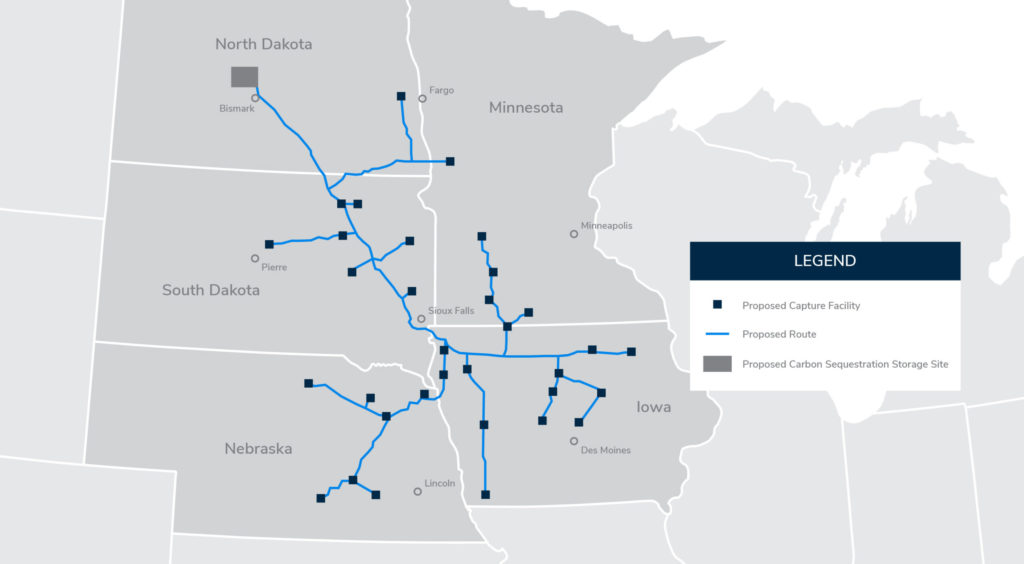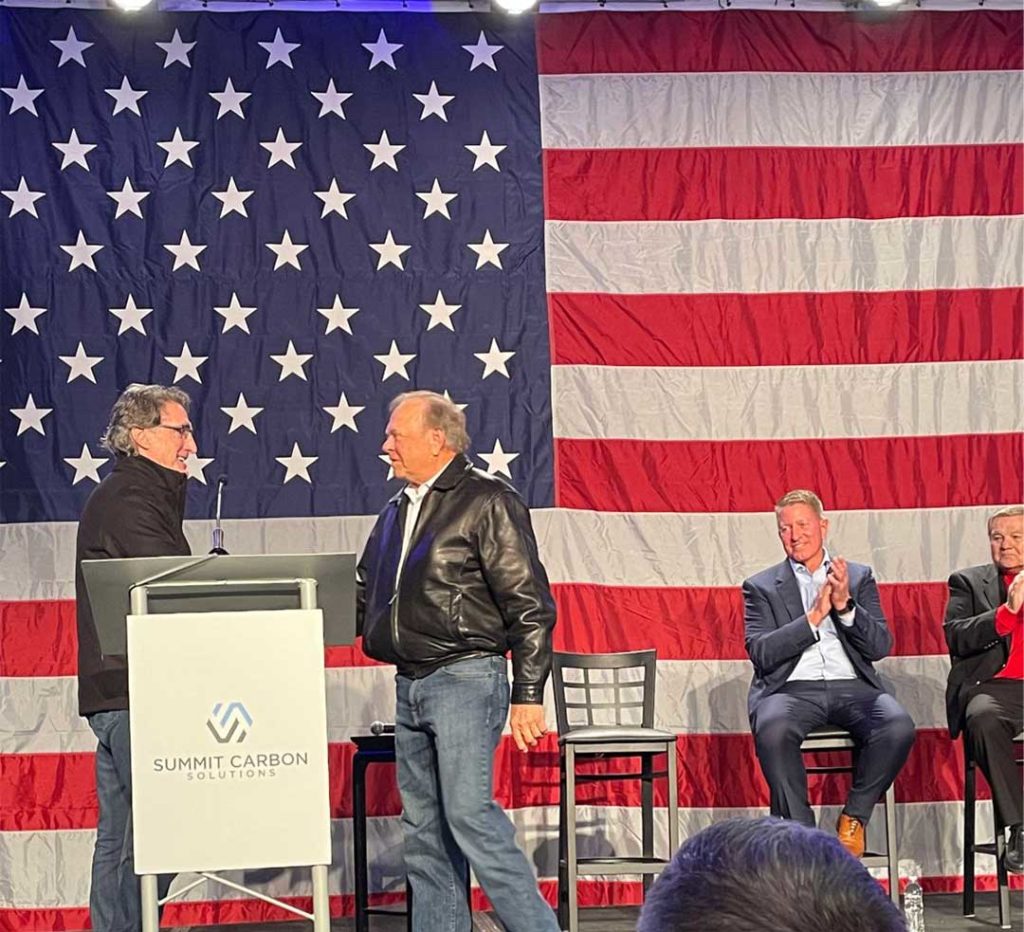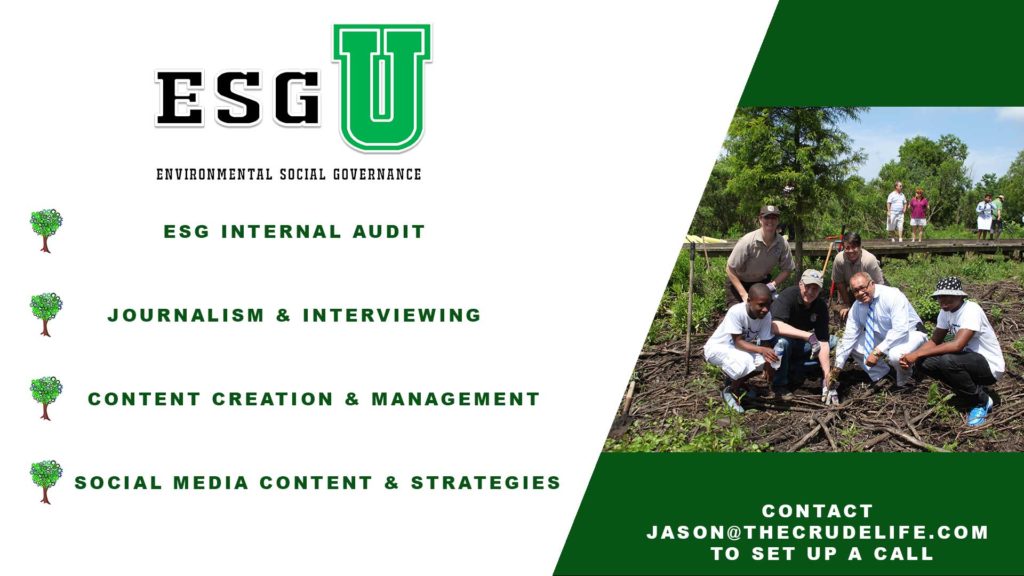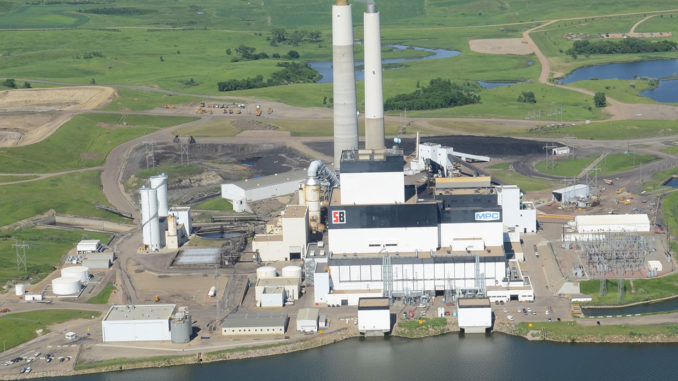

Burleigh County Commission Kathleen Jones talks about the use of eminent domain from governments and how they are used. The issue is in response to a group of landowners who showed up to the county commission meeting. It was a surprise to the commission.
“A gentleman from Richland County showed up and had some information that a group of North Dakota land owners put together. It was about a one-inch binder educating us about CO2,” Jones said. “The education was brief and to the point.”
Jones continued explaining why the group’s information was a shock to the meeting and why the information became controversial.
Host Jason Spiess weaves in some information on the Midwest Carbon Express Pipeline from a previous interview with Josh Swanson. Swanson, who is considered one of the top eminent domain attorneys in the state, recently won a ND Supreme Court Case Wilkinson vs. Board of University and School Lands involving mineral rights and payments in the Bakken and Lake Sakakawea.
Swanson said he is already hearing enough buzzwords and seeing enough behaviors to know this pipeline is not going to be as easy as some think.
“The overarching concern that I have is that we are on the precipice of some very important decisions when it comes to government power and government overreach and the state deciding what private land owners can and can not do with their own private property,” Swanson said.
Swanson mentioned Summit Carbon Solutions as an example and some of the recent news that has been surfacing regarding their business practices with landowners.
“Threatening eminent domain so early and throwing out the term ’eminent domain’ if you are any pipeline company and you are starting to lob out that Molotov cocktail of eminent domain you better know what you are doing,” Swanson said. “Cause you are going to light some stuff up and tick off some farmers, ranchers, private property owners by banding about that term cause its a legal term and legal instrument.”
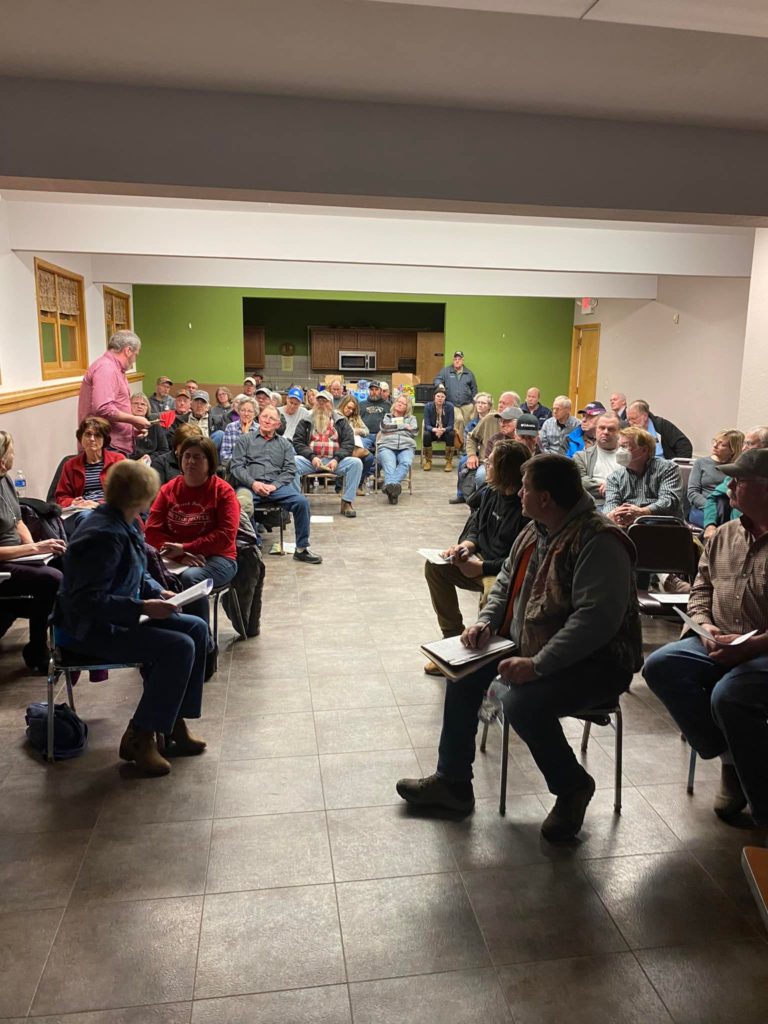
According to a story published in AgWeek, landowner Todd McMichael describes himself as becoming a “mouthpiece” for landowners in the path of the Summit Carbon Solutions pipeline in North Dakota who object to the threat of eminent domain to gain right-of-way for the pipeline.
He made a presentation in front of his county board in March, which unanimously adopted a resolution: “That the Richland County Commission officially opposes eminent domain for the Summit Carbon Solutions Pipeline within Richland County, North Dakota.”
Swanson and Spiess pontificated whether Summit Carbon Solution’s would cite “public health”, “climate change” or “public use” for the Carbon Pipeline. Whatever the justification is for throwing out the word “eminent domain” already, Swanson hopes for basic civility.
Swanson said that even though the Midwest Carbon Express Pipeline has gotten off to a rocky start, his hope is that this carbon company will follow oil and gas’ lead in professional decorum with landowners.
“Maybe they (Summit) will take heed and sit down and treat landowners fairly, at least that’s my hope,” Swanson said. “ONEOK, I will use them as my example, they are a company I deal with on pipeline right-a-ways all the time, and they are in not the most fair, one of the fairest companies when it comes to negotiation and fair terms when it comes to landowners and agreeing to put an oil and gas pipeline on their property.”
Both interviews dealt with the use of eminent domain and how the government uses it in ways that become good, bad or down right ugly.
The interview with Jones went further into the issues of carbon and what happens if an accident happens. Both Spiess and Jones pontificated about what could happen under five-feet of dirt or a mile deep. Both have asked questions to the state and both have gotten unsatisfactory responses.
“I still have not gotten a specific scientific answer to that (carbon),” Jones said. “CO2 has been around quite a while, most of my lifetime, and you would think by now the scientific community could come out and say ‘OK here’s what’s gunna happen is that gas is liquified and what wil that do to the bedrock.”
Jones continues citing questions she has asked state officials and how she is getting the run around of accountability.
“No one is quite sure who is in charge of this pipeline,” Jones said.
According to a news story by Forum Communications, Derrick Braaten, a Bismarck attorney who specializes in landowner rights, said Richland’s move doesn’t have teeth to block Summit from pursuing eminent domain, but he added that it does send a signal to regulators on the state’s Public Service Commission about local sentiments about the pipeline. The Public Service Commission does not directly oversee eminent domain, an issue often settled through the courts in North Dakota.
When North Dakota landowners first started getting letters about the project, North Dakota Governor Doug Burgum went on KFGO radio in Fargo and said there was “zero” chance that eminent domain would be used for the project in the state.
Less than a week later, in the Forum, Burgum spokesman Mike Nowatzki said that Summit has communicated their goal of achieving right-of-way agreements with all landowners without resorting to eminent domain, “and the governor supports that approach.”
However, interviews with land owners, county commissioners and attorney already contradicts Governor Burgum’s sentiments. Due to the Governor’s lack of support for North Dakota land owners, there is a growing number of land owners asking for Governor Burgum to issue a public statement of clarification towards Summit.
The $4.5 billion project known as the Midwest Carbon Express would transport carbon dioxide and transported via a 2,000-mile pipeline network from ethanol processing facilities in five Midwestern states to North Dakota for underground storage. Summit is partnering with 31 ethanol plants across Iowa, Minnesota, Nebraska, North Dakota, and South Dakota.
Last month, a South Dakota county on the North Dakota border imposed a moratorium on new pipelines in response to the Summit project, South Dakota Public Broadcasting reported . In Iowa, where opposition has been the most pronounced, less than 2% of landowners have signed onto easements for the project, according to an analysis by Reuters .
Wade Boeshans of Summit Carbon Solutions was recently interviewed by Spiess about the Midwest Carbon Express Pipeline, click here for the interview.
“What we have in the Williston Basin that makes it suitable for carbon storage, is thick layers of sand and sandstone one-to-two-miles below the surface with rocks that are high permeability and ferocity with lots of capacity of fluid to be stored within them,” Boeshans said.
After the CO2 is stored a couple miles below the surface, Summit Carbon Solutions monitors the levels to ensure safe protocols are taken and leak prevention.
“There’s several techniques for monitoring CO2, one is through the use of installing subsurface gages for the detection of CO2, monitoring the formations themself,” Boeshans said. “Secondly, is through the use of 3D seismic or other kinds of surface methods where you can actually verify and monitor, and finally you’ll have to continue to monitoring on the injection well bores up and down as well as monitoring the ground water continuously for detection of any CO2 that might show up in there.”
For more information on Summit Carbon Solutions click here
According to several land owners, there is a growing concern over the fact that Summit “went to Bismarck for approval before the landowners”. While many of the questions, complaints and café chatter are centering around eminent domain, many are concerns because the state passed legislation for such a pipeline last year.
North Dakota State Senator Jessica Bell introduced SENATE BILL NO. 2152 which relates to a sales and use tax exemption for carbon dioxide used for secure geologic storage. Some are starting to wonder if SB 2152 is why Summit is already using “eminent domain” with North Dakota land owners.
Summit Carbon Solutions, the Ames company behind a controversial carbon-capture pipeline in Iowa, said Thursday it will join an electric cooperative’s efforts to develop a $1 billion, 100-million-ton carbon dioxide storage facility in North Dakota.
Summit said Thursday it will work with Minnkota Power Cooperative to develop an underground storage facility at Minnkota’s Milton R. Young Station near Center, North Dakota, where the cooperative plans to capture emissions from the coal-fired power plant and sequester them.
While Summit and Minnkota have each independently worked to develop their carbon-capture and underground storage operations, they say they can “more quickly, efficiently and cost-effectively advance their projects” by working together.
In March, The Crude Life reported that Carbon Summit Solutions, Tharaldson Ethanol Plant and Continental Resources Inc. held a press conference a March announcing Continental Resources will commit $250 million over the next two years to help fund the development and construction of Summit’s $4.5 billion carbon capture and sequestration project.
Continental Resources Chairman Harold Hamm and CEO Bill Berry along with Summit Agricultural Group CEO Bruce Rastetter attended a press conference hosted by North Dakota entrepreneur Gary Tharaldson at the Tharaldson Ethanol Plant in Casselton, which is participating in the carbon capturing project.
North Dakota Gov. Doug Burgum and Nebraska Gov. Pete Ricketts also attended the press conference which highlighted the importance of carbon capture and storage to U.S. energy security.
North Dakota Senator Cramer has been active getting the deal facilitated for Summit too. Senator Cramer recently met with Continental Resources Chairman Harold Hamm where they discussed carbon capture and the 45Q tax credit.
Sponsors, Music and Other Show Notes

Studio Sponsor: The Industrial Forest
The Industrial Forest is a network of environmentally minded and socially conscious businesses that are using industrial innovations to build a network of sustainable forests across the United States.
Weekly Sponsor: KBL Complete Services
Strikingly dynamic, incomparably strong and absolutely reliable, KBL Complete Services excels at all of your pipeline needs. From AGM Surveys, ILI tool tracking, Digsite Locating, and Equipment Decontamination, to Project Management, KBL Complete Services are ready to make your project a success.

Weekly Sponsor: Great American Mining Co
Great American Mining monetizes wasted, stranded and undervalued gas throughout the oil and gas industry by using it as a power generation source for bitcoin mining. We bring the market and our expertise to the molecule. Our solutions make producers more efficient and profitable while helping to reduce flaring and venting throughout the oil and gas value chain.

Join Podcasters from across the world and all walks of life as they unite to bring civil solutions to life and liberty.

Studio Email and Inbox Sponsor: To Be Announced

Featured Music: Alma Cook
For guest, band or show topic requests, email studio@thecrudelife.com
Spread the word. Support the industry. Share the energy.

